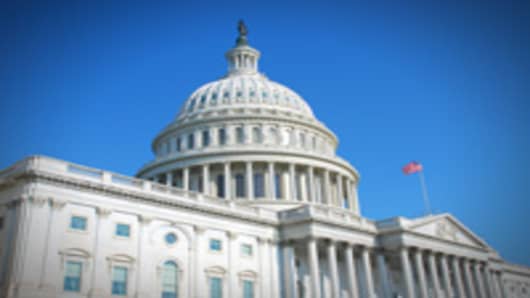For all the supercharged attention leading up to the non-report from the congressional supercommittee on deficit reduction, it's hard to come to any other conclusion that — for now, at least — no one really cares.
We did see a downdraft in markets following Congress' failure to produce a plan to reduce long-term deficits — as we did following the debt limit increase, but these were coincidental events: global markets are reacting to developments (or lack thereof, in Europe). It's clear that the Eurozone is either in, or about to enter, a prolonged recession, and its sovereign debt woes could even lead to an ultimate break-up of the monetary union.
As for America's own sovereign debt woes, they remain for the future. For now, a flight to safety in this turbulent and volatile economy really means a flight to liquidity. And there simply is no more liquid place to be than the U.S. treasury market. Where else are you going to go? German bunds? Not so fast.
Germany saw today how quickly market sentiment can change, experiencing a severely undersubscribed 10-year bond auction – an ominous sign. Other potential flight-to-safety markets are insufficiently liquid and/or — as in the case of Switzerland — unwilling to accept the resultant currency strengthening.
As long as liquidity is king, the U.S. will be able to sell its debt at favorable rates. This is the great irony of running up $15 trillion of debt: the enormous U.S. treasury market presents to global market participants the one place they can park or access cash on a relatively risk-free basis.
This "service" to global investors is today afar more valuable exorbitant privilege than even the related fact of the U.S. dollar as a reserve currency. Combined with the Fed's monetary policy actions, the need (not desire) to buy U.S. securities has delivered us a 10-year note yield hovering at around 2% -- cheap money for Treasury's debt managers, and correspondingly lower borrowing rates for U.S. consumers and businesses.
So the collapse of efforts to even marginally put America on a better fiscal path is being met, dangerously, with a collective shrug. U.S. officials are comfortable postponing significant deficit reduction measures until after the 2012 elections at the earliest, seemingly indifferent to the possibility that the world could change. Over the near-term, this complacency is being undeservedly rewarded. Volatility and hyper-liquidity needs will be with us for a while. Resolving, or perhaps restructuring, the EU is a long process, and there are credible reasons to prepare for a crisis in China. King Liquidity could have a long reign.
The bad news is that the longer the U.S. delays addressing its debt burden, the greater the likelihood of disruptive eventsonce global markets stabilize and the search for liquidity is replaced by asearch for yield. Market participants can't be expected to effectively pay the U.S. Treasury to warehouse their cash forever.
The long-term price of today’s indifference is one rate that will keep rising.
Tony Fratto, is a Managing Partner at Hamilton Place Strategies, former Assistant Secretary at the U.S. Treasury Department, and a former White House official. He is also an on-air contributor for CNBC and founder of the policy discussion website rooseveltroom.net You can follow him on Twitter at http://twitter.com/TonyFratto.


